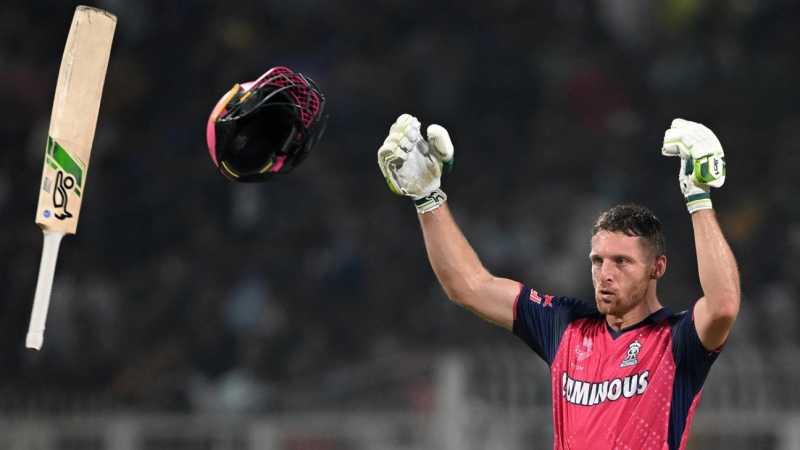Jos Buttler has defended the ECB’s decision to pull players out of the IPL playoffs in order to feature in England’s T20I series against Pakistan – but believes that no international cricket should clash with the world’s premier franchise league.
Buttler is one of eight members of England’s provisional T20 World Cup squad who left the IPL before the end of the group stage last week, and one of four – along with Will Jacks, Reece Topley and Phil Salt – whose franchises qualified for the knockouts. England’s players reported to Leeds on Saturday night ahead of Wednesday’s opening T20I.
Rob Key, the managing director of England men’s cricket, said last month that Buttler had driven the decision to bring players home from India, and that it would be important for the squad to spend some time together before travelling to the Caribbean. “I said, ‘Look, as an England captain, my main priority is to be playing for England,'” Buttler said on Tuesday.
“It’s my personal opinion that there shouldn’t be any international cricket that clashes with the IPL. I think that these games have been in the calendar for a long time. Of course, leading into a World Cup, your No. 1 priority is playing for England and performing for England. I feel like this is the best preparation.”
Buttler is a key player at his franchise Rajasthan Royals, and has left a big hole in their side ahead of their Eliminator against Royal Challengers Bengaluru on Wednesday. Tom Kohler-Cadmore was picked for their final two group games in Buttler’s absence, but made 18 off 23 balls in his only innings to date.
Other national boards have taken the alternative view from the ECB, with West Indies and South Africa both missing players for their T20I series in Jamaica this week due to their franchise commitments. Ireland allowed Josh Little to stay in India during their recent series against Pakistan, who have been playing T20Is throughout the IPL since their players are not involved.
Key said last month that he had tried to keep the situation “pretty fluid” with players before deciding they would come home and there has been some disquiet in India about their early return – albeit primarily within the media, rather than IPL franchises themselves.
Sanjay Bangar, the head of cricket development at Punjab Kings, claimed on Sunday that the ECB had “made it clear that all the players are going to be available” before December’s auction. But as ESPNcricinfo reported at the time, this was always “subject to fitness and international duty and any periods of unavailability that players submitted on their auction applications”.
The dates for England’s T20I series against Pakistan were announced in July 2023 and the series has been in the ICC’s Future Tours Programme since August 2022. By contrast, the BCCI only publicly finalised the IPL’s fixture list for the 2024 season once the tournament had started, with India’s general elections causing a delay.
Sam Curran, who captained Punjab in eight of his 13 appearances this season, said on Monday that the ECB’s decision “makes great sense”. Curran said: “It was a decision that was made, that it was probably the right thing for us all to come back. It was only fair for all franchise to lose a player each or so… it would have been quite harsh if some franchises got to keep a couple of players and then some didn’t.
“I think Jos, Motty [Matthew Mott] and Keysy wanted us all back together for this series. It makes great sense, because obviously we want to be playing as a team and get used to our roles. It’s quite hard when you go tournament to tournament, and then straight into a big tournament like [the World Cup] where you haven’t really played together.”
The Federation of International Cricketers’ Association (FICA) will hold a global scheduling symposium for members later this year and the organisation’s CEO, Tom Moffat, told ESPNcricinfo that a recent player survey – which will be published imminently – shows widespread support for international and franchise ‘windows’, as Buttler proposed.
“Our positions are guided by the players and in our latest global player survey completed this year, 84% support global scheduling windows so that domestic leagues and international cricket can co-exist,” Moffat said. “That’s not easy to achieve and would likely require a reduction in overall volume of international cricket and would also mean some leagues competing with other leagues.”
